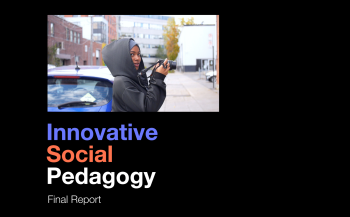The ePub was organized by Veronica Mockler (the CSLP’s Artist-in-Residence), and was written in collaboration with RAs Ashley Montgomery and Rawda Harb, and may be downloaded here (please note that you may need to download Adobe Digital Editions to view the ePub document).
ISP is an initiative of Project SOMEONE that aims to promote critical digital literacy, empower marginalized communities, and reduce gender and racial biases through evidence-based principles in social pedagogy.
The project previously published two other Policy Briefs, one on gender-based killings of women and girls in Quebec well as a book chapter on Islamophobia in Quebec and Canadian media. An ongoing podcast hosted by Concordia 2023 Public Scholar Dalia Elsayed is also a product of this dynamic project. For a full account of the outputs from the project, please consult the Project Someone website.
About ISP
The Innovative Social Pedagogy* to Empower Indigenous Communities, Reduce Gender, and Racial Biases project is funded by Employment and Social Development Canada (ESDC). The project took place over 3 locations, Montreal, Chicoutimi, and Edmonton and over the span of 3 years. Project Someone (Concordia University, Montreal), the University of Alberta and The Université du Québec à Chicoutimi, along with community partners, co-created, adapted and evaluated four distinct types of interventions. These are interactive workshops, documentaries and multimedia, online courses, and policy briefs.
*Social pedagogy refers to the inclusive and reflexive co-creation of interventions and strategies to better magnify the voices of marginalized communities that have been undermined due to systemic discrimination that accompany hierarchies of knowledge and power.
The project was aligned with the UN 2030 Sustainable Development Goals (SDGs) concerning quality education, equality, gender, partnerships and establishment of strong institutions that promote peace and justice.
- SDG 4 (quality education): eliminate all discrimination in education;
- SDG 5 (gender equality): end discrimination against women and girls; ensure full participation in leadership and decision-making;
- SDG 10 (reduced inequality): ensure equal opportunities and end discrimination;
- SDG 16 (peace, justice & strong institutions): reduce violence everywhere; promote and enforce non-discriminatory laws and policies; and
- SDG 17 (partnerships): target encourage effective partnerships.


